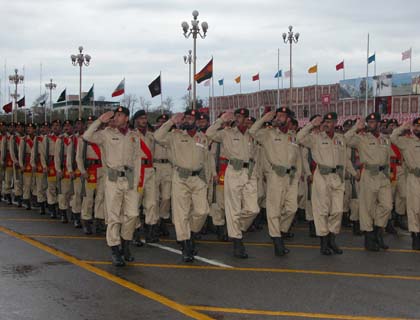It was Pakistan's day in Afghanistan. On April 16, 2011, the almost entire Pakistani leadership descended on Kabul to hold talks with the Afghan government. The Pakistani leaders included: Prime Minister Yousuf Raza Gilani, Interior Minister Rehman Malik, Deputy Foreign Minister Hina Rabbani Khar, Defence Minister Chaudhry Ahmad Mukhtar as well as Pakistan Army chief General Ashfaq Kayani and Shuja Pasha, the chief of Pakistani military's Inter-Services Intelligence (ISI). The talks in Kabul were led by President Hamid Karzai, with the Afghan delegation also including Afghan military and intelligence leaders.
General Kayani and Lt-Gen. Pasha are two powerful Pakistani leaders who virtually dictate Pakistan's foreign policy on Afghanistan, India, Kashmir and the U.S. During the day-long talks, it was decided to establish a two-tier Joint Afghanistan-Pakistan Commission, an unprecedented move that facilitates the presence of the Pakistan Army chief and Shuja Pasha on the commission, giving them greater role in moulding Afghanistan's internal affairs and foreign policies. Speaking after the talks, President Karzai said: ''The Pakistan's prime minister, the chief of Army staff and the intelligence agency chief would now represent the country on the peace commission, charged with finding a way of reaching a peace deal with the Taliban.''
It is perhaps for the first time that the Pakistani military has formally embedded itself into a mechanism that allows it to directly shape the future of Afghanistan. A report in the Pakistani daily The News April 17, 2011 edition noted: ''The joint commission will work at two levels. The chief executives of both the countries, army chiefs, heads of intelligence agencies and foreign and interior ministers will comprise the first tier of the commission while foreign and interior secretaries, directors-general of military operations, and directors-general of military intelligence will form the second tier.''
The timing of the Kabul talks is significant for two reasons. First, there is a near-total breakdown in Pakistan's relationship with the U.S. while the Karzai government's relationship with the Obama administration is also rough. Second, Pakistan Army is motivated to shape the situation in Afghanistan following the withdrawal of the U.S. troops, which is to be completed by the end of 2014, when the NATO plans to hand over all security responsibilities to the Afghan security forces.
Although General Kayani and Shuja Pasha dictate Pakistan's policy on Afghanistan, it is the Pakistani civilian government leaders who put forward the day-to-day Pakistani policies in dealing with the Afghan government. During the Kabul talks, Prime Minister Gilani presented written demands before the Karzai government. Details of these demands are beginning to leak to the media. An April 19, 2011 report by Afghan television channel Tolo News noted that Gilani's demands included: Pakistan should be consulted on training and number of Afghan security forces; implementation of Pakistani strategies by future Afghan governments and recruitment of Pakistani officials in Afghan government institutions should be ensured...''
These demands were confirmed in another Pakistani media report. On April 20, a headline in the Urdu daily Roznama Jasarat read: ''[Afghanistan told it] will have to follow our strategy, Pakistan's stern message to Afghanistan.'' The Urdu daily wrote: ''Gilani delivered a stern message from Pakistan to the Karzai government in which it has been said that Afghanistan will have to consult with Pakistan regarding the number and training of its security forces... the future governments in Afghanistan will have to follow the Paksitani strategy...; and Afghanistan will inform Pakistan regarding any agreement signed with the Western allies, including the U.S. and NATO...''
Commenting on the Pakistani moves, the Tolo News report said that during the past ten years Pakistan has increased its influence in almost all Afghan government institutions, including the foreign ministry. For those who are opposed to the Taliban, the Pakistani military's moves to shape the future of Afghanistan are a cause of concern. In recent months, the Pakistani-backed Taliban have mounted successful attacks in Kabul, Jalalabad and other Afghan cities. On April 19, I asked former Afghan Foreign Minister Dr. Abdullah Abdullah, who was in Washington, to comment on the military gains in Afghanistan. He said that while Afghanistan and Pakistan are talking to each other, the Taliban ''sanctuaries'' in Pakistan remain the main issue for Afghanistan.

